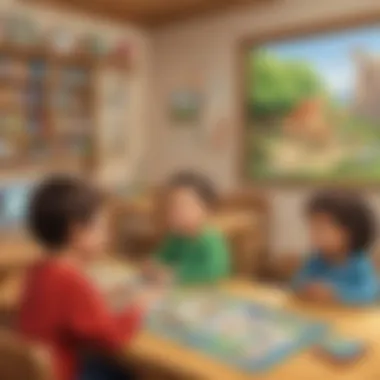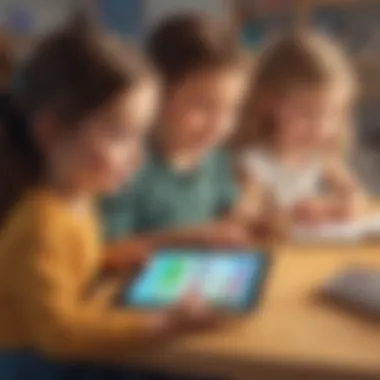Free Online Literacy Games for Engaging Kindergarteners


Intro
In today’s digital age, literacy skills develop becuse of a mix of traditional methods and modern technologies. Engaging children in activities that foster both reading and writing can often seem daunting. However, free online literacy games provide an effective solution. The intersection of fun and education fosters an atmosphere conducive to learning, especially for kindergartners. This article explores various games and apps that not only engage these early learners but also enhance their literacy skills.
By leveraging technology, parents and educators can introduce literacy concepts in a playful setting. It matters significantly how a child engages with letters, sounds, and words, shaping their future reading and writing capabilities. So, we dive into creative online resources designed specifically for young learners to facilitate a successful literacy journey.
Creative Activities
Introducing creative activities at an early age supports foundational literacy skills. These games often come coupled with creative projects that young children can engage with. In this section, we touch on various aspects of creative literacy activities that support learning outcomes and enhance engagement.
Craft Ideas
Crafting can augment the learning experience greatly. Simple craft ideas enable children to replicate ideas effectively. Engaging with letters or rhymes through craft adds depth to their understanding. A few potential craft ideas may include:
- Letter collages: Use magazines to cut and paste letters and create a visual representation of the alphabet.
- Story stones: Paint images or letters on stones that inspire children to create their own stories.
- Alphabet masks: Create masks featuring letters or sounds that they can use in storytelling.
These activities make learning enjoyable and reinforce concepts they enc متtitionally learn in a digital format.
Step-by-Step Guides
Knowing how to execute each craft can determine its effectiveness. Adults should follow clear, concise steps to guide children through the activity:
- Gather necessary materials.
- Introduce the concept or target skill.
- Explain each step of the crafting process.
- Encourage children to express their creativity during the process.
- Discuss how the craft connects back to literacy.
Clear guides enable consistent results across varying skill levels. With proper guidance, even difficult concepts can be made simpler.
Educational Value
Creative activities wield significant weight in early education. Not just as a diversion, crafting allows developers of literacy games to cover areas like questions of texture and shape, as well as lessons in patience and problem-solving. Crafting encourages proficiency in:
- Fine motor skills
- Imagination and creativity
- Sequential thought processes
Thus, merging these creative activities into literacy games establishes a strong foundation fostered by consistent exposure.
Fun Quizzes
Quizzes serve uniquely as a tool for reinforcing concepts learned through interactive participation. It allows children to gauge their learning while having fun. The platform SuperSimple offers an rich collection aimed at various reading topics that all ages enjoy.
Quiz Topics
Among the themes covered include phonics, comprehension, and vocabulary. Varied topics keep children's interest levels up and aid in continous learning. It keeps the content fresh withul more opportunities to boost conceptual understanding
Question Types
These quizzes adapt different types of questions, including:
- Multiple choice questions
- Fill in the blank
- Picture-word matching
Different question styles help sustain attention and cater to diverse ways inwhich children absorb научения material.
Knowledge Reinforcement
By exercising with quizzes, children not only have fun but also strengthen their acquired knowledge. Frequent quizzes reinforce crucial takeaways, solidifying learned skills. For instance, quizzes following stories or lessons encourage children to adapt skills learned in comprehensive methods when engaging with new material later on.
Fact-Based Articles
Reading factual content supports comprehension while broadening children's understanding of various topics. UINT magazines offer accessible articles suitable for young readers.
Topics
The topics available span multiple subjects including seasons, animals, and notable inventions, which keeps learners engaged through divers artceduals.
Engaging Content
Each article uses simple language, catchy phrases, and engaging visuals tailores to attract bright young minds. The presentation is structured so that complex ideas become simple and digestible for growing minds.
Understanding Literacy Development
Literacy development is a crucial aspect of a child's education, particularly in the formative kindergarten years. This stage is pivotal for laying the groundwork for reading and writing skills. Understanding literacy development helps in framing the strategies for teaching young learners. When children interact with text and engage in journals and discussions, they begin to form meaningful connections between sounds and letters.
The foundation built through literacy development conveys the importance of early exposure to various learning techniques. Early literacy skills increase children's ability to engage with books, which leads to a greater understanding of their world. Moreover, classes that encourage engagement will foster a natural curiosity about language and thus cultivate a love for reading. This article will dissect the fundamental aspects of literacy, emphasizing its relevance and the various components that promote literacy in kindergarten-aged children.


The Importance of Early Literacy Skills
Early literacy skills play a significant role in a child's ability to succeed academically. Children who develop these skills are better prepared for future learning opportunities. Early literacy combines diverse skills, like understanding letters, sounds, and words, and leads to an overall ability to communicate and understand language successsfully. Importantly, integrating activities focusing on literacy from an early age instills confidence in children. Through interactive activities, they gain a sense of achievement and readiness for more complex tasks ahead in their educational journey.
Key Components of Literacy for Kindergarten
Understanding the key components of literacy is vital for kindergarten educational strategies. Teachers and caregivers should prioritize a balanced focus on these components. The four primary aspects include:
- Phonemic Awareness
- Vocabulary Building
- Reading Comprehension
- Writing Fundamentals
Phonemic Awareness
Phonemic awareness refers to the ability to notice and manipulate the sounds in spoken words. It is an early reading skill that contributes significantly to literacy development. Recognizing individual sounds in words allows children to decode them later in their reading journey. One key characteristic of phonemic awareness is that it develops before children learn to read. As a beneficial choice for this article, phonemic awareness has a direct tie to reading success and is crucial for all aspects of literacy instruction. The uniqueness lies in its simplicity; children can engage in phonemic activities through games and songs, making it enjoyable. However, without a solid focus on phonemic awareness, some children may lag behind their peers in reading ability.
Vocabulary Building
Fostering a robust vocabulary is essential early in life. Vocabulary building aids comprehension and expression. A rich vocabulary is linked to better communication skills and confidence in language use. This article highlights vocabulary's role as a trend in literacy development, resulting in children who feel comfortable and competent in trying out new words. A distinct feature of vocabulary building is that it can happen contextually; children learn prompts through daily interactions and storytelling. One benefit is broader word exposure, which lateral enhances writing skills and paves the way for subsequent academic success. Still, it may falter unless actively pursued through reading and conversations.
Reading Comprehension
Reading comprehension represents a critical skill for kindergarteners, linking their understanding of texts with their ability to think critically. It is not simply reading but interpreting and making meaning from stories. Understanding develops when children apply techniques like predicting what might happen next in stories, which also adds excitement. This component is a norral aspect of successful literacy since good comprehension abilities will ease transitions to higher grade reading tasks. Unique features, such as asking questions related to stories, can significantly improve reading comprehension skills. An advantage massive for to cosmic understanding amongst newcomers that standard methods could underline a struggle among learners who do not get appropriate guidance.
Writing Fundamentals
Writing lays a solid foundation for children to express their thoughts and ideas clearly. Teaching writing skills, from simple letter formation to sentence principles to storytelling, allows children to articulate themselves. Letter-sound relationships are a central aspect. Reliable feedback encourages goal-setting, aiding young artists in enhancing their writing processes and reflections. Providing kids with writing opportunities—fundamental both for literacy and overall cognitive growth—is essential. On the flip side, there is a recognition of varying development rates. Children may often draw pictures during this process, posing another beautiful and valuable point of expression.
Encouraging literacy growth through these components prepares students for various future challenges. Each character sustains the construction of a reader, proficient in their interaction under overall angles. When kindergarten usage relies on novelty themes fitting to literacy, ultimate fluency is insightfully achievable.
Advantages of Online Literacy Games
Using free online literacy games can significantly enhance learning for kindergarten students. These digital tools offer various advantages that aid both young learners and their educators. The use of engaging platforms fosters an active interest in literacy while providing opportunities for improving essential skills in a playful, engaging format.
Engagement and Motivation
Online literacy games naturally capture the attention of young learners. Children are drawn to interactive formats, which are perhaps more entertaining than traditional reading activities. Websites like Starfall and PBS Kids portray education as a delightful experience. Of course, this interest leads to higher levels of engagement.
Games often feature colorful graphics and lively characters. Not only does this appeal to children's imaginations, but it also keeps them focused on the task at hand. This innate motivation encourages them to return to the game repeatedly, sparking a genuine curiosity about reading and exploring new words, phrases, and stories.
Additionally, the scope to win points gives kids clear goals. Children become directed as they check their progress and strive for rewards within the game. Recognition of achievements serves as encouragement. Such elements play important roles in boosting self-esteem and reinforcing learning. After all, when learners are motivated, they are likely to achieve literacy goals more readily.
Personalized Learning Experiences
Every child is different in their learning pace and interests. Online literacy games can adapt to individual skill levels. For instance, a child might struggle with phonics while another excels. Personalized learning allows targeted practice, directing each player towards their appropriate challenges.
Platforms often include assessments that adapt in real-time. This personalization ensures that skills are built on effectively. Games gradually increase in difficulty as learners demonstrate competence. As such, particular educational content is more relevant to each child, fostering understanding without frustration.
Moreover, parental involvement can enhance this experience further. Parents may assist by selecting games tailored to meet their child's specific needs. By playing together, parents encourage a shared learning moment. This nurtures kid's confidence and enhances enjoyment in literacy-based activities.
Immediate Feedback and Assessment
One significant advantage of online literacy games is their instant feedback feature. Children appreciate knowing how they are progressing without unnecessary delays. After responding to a question, learners receive immediate confirmation or correction. This constant percussiveness in feedback fosters comprehension.
With each interaction, children come to understand what they grasp and where they may need improvement. Such ability to measure progress bolsters confidence and nurtures a proactive approach to learning. This cycle of practice and assessment encourages healthier development of skills, building a solid foundation for future literacy areas.
Research has shown that immediate feedback in learning environments significantly increases retention and understanding.
Real-time strategies underscore this team of responsive learning spaces. Students can revisit concepts regularly, fine-tuning skills with dynamic interaction before moving on. They tend to engage more deeply when their journey is closely monitored, proving beneficial for literacy development.
Types of Free Online Literacy Games
In the context of early childhood education, having a selection of free online literacy games plays a key role in developing foundational skills. This section discusses the various types of games available and how each aligns with specific literacy objectives. Each platform offers distinct benefits that cater to the needs of kindergarteners, making the games both effective and enjoyable.
Phonics Games
Phonics games are essential for kindergarten students. They help children understand the sounds that letters make, a crucial step in reading. These games typically include activities that involve matching sounds to letters or making simple words. By reinforcing phonemic awareness, children become more confident when they start recognizing words in books. Games like those on Starfall not only engage kids visually but also provide a hands-on approach to phonics learning.
Benefits of Phonics Games:
- Enhances sound-letter correspondence.
- Encourages independent learning through interactive formats.
- Facilitates the development of spelling skills from an early age.
Word Recognition Games
Word recognition games focus on helping young learners identify and comprehend common sight words. These games are vital, since sight words form the basis of fluent reading. For instance, games offered by PBS Kids utilize fun and colorful visuals that attract young children's attention. Engaging designs make it easier for students to remember words as they encounter them in their readings.


Benefits of Word Recognition Games:
- Boosts reading fluency by helping children encounter words repeatedly.
- Provides instant feedback on word identification, helping them track progress.
- Uses game mechanics to create a sense of accomplishment.
Storytelling Activities
Storytelling activities foster creativity and comprehension in young learners. They can be as simple as assembling a story from given pictures or narrating a tale through interactive platforms such as ABCmouse. These activities encourage students to think critically about narratives and understand plot and sequence.
Benefits of Storytelling Activities:
- Develops listening and speaking skills.
- Promotes comprehension by analyzing story elements.
- Stimulates imagination and creative thinking in young minds.
Spelling Challenges
Spelling challenges serve as a fun way for students to practice spelling through interactive games. These games often incorporate a variety of levels suited to different abilities, allowing children to progress at their own pace. Scholastic Learn at Home features spelling challenges that reward children as they master different words, emphasizing achievement through fun.
Benefits of Spelling Challenges:
- Solidifies spelling knowledge through repetitive exposure.
- Increases vocabulary as young learners encounter new words.
- Encourages routine practice without it feeling like a chore.
Popular Platforms for Online Literacy Games
The growth in technology has reshaped the educational landscape, particularly for early learners. Online literacy games offer unique opportunities to promote active engagement. The significance of this section lies in identifying reliable platforms that curate free online literacy games for kindergarten students. Each platform brings distinct features and methodologies that influence how children learn basic literacy skills.
Gone are the days when learning was confined to classrooms. The platforms listed below are valuable resources for parents and educators looking to augment children’s learning while simultaneously making it enjoyable.
Starfall
Starfall operates on the principle of making learning enjoyable through interactive games and storytelling. The application caters especially well to preschool and kindergarten age groups. It offers a mixed approach, enabling children to develop foundational skills in phonics and vocabulary. With its colorful interface and engaging content, children are drawn into a world of letters and words.
Starfall emphasizes phonemic awareness, helping children recognize sounds as they correspond to letters. The platform also includes free resources without subscription, making it accessible for everyone. Teachers appreciate integrating Starfall into their lesson plans to add a digital component to learning activities.
PBS Kids
PBS Kids is recognized for enriching children's learning experiences through its vast selection of free educational games. Well-known characters from popular shows engage kids in activities that reinforce literacy concepts. These games are designed to be fun while delivering learning outcomes.
Interactive videos, games, and printables develop critical reading skills such as word recognition and comprehension. Sugarcoating educational principles with familiar child-friendly characters helps bridge the gap between teaching and entertainment. The recognizability refernced in PBS Kids is a great advantage because many kids look forward to interacting with characters they already love. This familiarity often leads to increased motivation and engagement in learning activities.
Scholastic Learn at Home
Scholastic Learn at Home offers a well-rounded learning experience through its comprehensive approach to literacy games. The platform provides curriculum-based adventures, guiding children through various learning paths related to reading, writing, and critical thinking. Educators value the connection to real-world scenarios, stimulating interest in literacy.
The program also includes various resources such as eBooks and worksheets alongside literacy games to help deepen understanding. This blend is essential for making connections between interactive play and focused learning, providing both immediate fun and long-term educational benefits.
ABCmouse
ABCmouse stands out for its structured learning pathway, providing a blend of games, activities, and lessons designed for early learners. This online platform covers essential literacy elements through interactive lessons that grow with the child. Each unit is developed to encompass phonemes, vocabulary, and reading comprehension in a sequential manner, fostering progression at an individual pace.
Parents find merit in the tracking tools provided, which allow monitoring of learning milestones achieved by their children. The added accessibility through multiple devices allows children to learn wherever, making ABCmouse a favored choice for many families. With a trial period to explore its functions, newcomers have a solid basis before committing.
Choosing reliable platforms is paramount when integrating online literacy games into your child’s educational routine.
In summary, each platform presented plays a pivotal role in providing young learners with a solid groundwork in literacy skills. By taking advantage of these resources, parents and educators can ensure a multifaceted approach to engaging preschool and kindergarten students. This not only enhances learning through interactive means but also instills a passion for reading and writing early on.
Tips for Implementing Online Literacy Games
Implementing online literacy games in a kindergarten setting presents an opportunity to enrich traditional teaching methods. These games can engage young minds and enhance their learning experience. However, careful planning and execution are necessary to reap the benefits effectively. Here we focus on important elements, benefits, and considerations.
Setting Goals
Establishing clear goals is key for successfully incorporating online literacy games. Goals should reflect the specific literacy skills you want to develop.
- Focus on foundational skills. For younger children, this could include phonemic awareness, vocabulary, and early reading skills.
- Be specific. For example, aim to improve word recognition or listening comprehension in a given timeframe.
- Adjust goals as needed. Online literacy games can adapt, helping you tailor objectives based on your child's progress.
Setting achievable milestones keeps children motivated, resulting in increased engagement with learning activities.
Monitoring Progress
Tracking progress is equally important when using online games for literacy development. It enables parents and educators to assess how effectively children are improving over time.
- Use available metrics. Many online platforms will provide reports or data to help visualize how children perform.
- Engage in conversations. Speak with your child about their experiences and feelings towards the games to gain insight into their learning process.
- Regularly review outcomes. Analyze not just completed tasks but also the skills demonstrated within the games.


Monitoring progress allows adjustments in teaching strategies and game choices, ultimately benefiting the learner.
Creating a Balanced Curriculum
An effective curriculum incorporates a mix of activities, including both online games and traditional literacy methods. A balanced approach helps meet diverse learning needs.
- Diversify literary techniques. This can mean combining phonics games with storytelling or spelling challenges to provide varied learning experiences.
- Allocate time wisely. Depending on the child's comfort and responsiveness to literature, schedule game time alongside reading sessions away from the screen.
- Involve families. Providing resources for parents to engage with games at home promotes a supportive learning environment.
Creating a balanced curriculum nurtures various skills and encourages holistic development while catering to the child’s interests.
Challenges and Considerations
When integrating free online literacy games into early childhood education, it is crucial to understand potential challenges and special considerations. These factors can significantly impact how games are used, and their effectiveness in enhancing literacy skills. Careful management in these areas can help maximize the benefits of these digital tools.
Screen Time Management
In the modern educational landscape, the issue of screen time management has taken on heightened importance. Children in kindergarten are still developing their cognitive and physical skills. While online literacy games are educational, excessive screen time can lead to detrimental effects. It is fundamental for parents and educators to establish a balanced routine.
Some ways to manage screen time effectively include:
- Setting clear time limits for game sessions.
- Encouraging offline activities that complement digital learning, such as reading books or engaging in storytelling.
- Monitoring the types of games played to ensure they are age-appropriate and productive.
Parents should engage actively with their children during gameplay. This interaction can enhance comprehension and motivate children to explore new topics. It is also an opportunity for adults to assess how well their children are using the games to their educational advantage. Proper management helps in cultivating a healthy relationship with technology.
Equity in Access
As online literacy games grow in popularity, the question of equity in access arises. Not all families have the same resources. Factors like affordability of devices or stable internet connections can disproportionately affect a child's ability to engage with these educational platforms. This disparity raises an important consideration when schools implement digital literacy programs.
To address this, it is essential for educational institutions to:
- Provide devices: Schools could offer loaner programs for families without access to personal devices.
- Facilitate access to community internet resources for families without consistent connectivity.
- Incorporate mixed-modality teaching that uses both digital and offline tools.
By taking these steps, educators can ensure that all children have the opportunity to benefit from online literacy resources, regardless of their background or situation. Achieving an equitable environment where every child can thrive requires ongoing effort and commitment from various stakeholders, including schools and communities.
Ensuring access to online literacy games contributes to overall educational equity and enhances early literacy skills in all children.
These challenges and considerations aren't simply obstacles to address but rather opportunities to improve the educational landscape for young learners.
Future of Literacy Games
The landscape of literacy education is rapidly evolving. Understanding the future of literacy games is essential in leveraging technology for improving reading and writing skills among kindergarteners. These games will continue to be a crucial part of the educational framework in the coming years. They not only make learning fun but also provide various advantages that can transform early literacy instruction.
Technological Advancements
Technological advancements are paramount to the development of interactive literacy games. The integration of more sophisticated software and hardware allows for dynamic user experiences. Here are some critical points to consider:
- Increased Interactivity: Innovative platforms are creating opportunities for real-time interaction. Children can engage with the material in diverse ways, reinforcing their learning without the usual constraints of a traditional classroom.
- Gamification: Game-based elements enhance engagement. Incorporating point systems, levels, and rewards can motivate young learners to practice more often. This makes the learning process less tedious.
- Improved Accessibility: Rising technology provides tools that cater to various learning needs. Features such as speech-to-text and tailored content level the playing field for all students.
Children learn best when they are engaged and invested in their learning. Advancements in technology facilitate more personalized and motivating experiences.
Integrating AI in Learning
Artificial Intelligence (AI) is revolutionizing educational gaming by making learning experiences tailored to each child's abilities. The incorporation of AI in literacy games offers substantial benefits:
- Personalization: AI can adapt the content based on individual progress. This means games can provide resources at an appropriate difficulty level, maximizing potential learning outcomes.
- Immediate Feedback: AI systems can give on-the-spot assessments. This real-time feedback helps learners correct mistakes as they progress. It’s an efficient way to encourage growth while minimizing frustration.
- Data Tracking: AI can analyze patterns in student performance over time. This helps educators understand where children struggle or excel. Consequently, teachers can modify lessons to better align with each child's needs.
The future of literacy games relies on effectively mergechng technology and teaching. For kindergarten students, engaging tools are essential for developing foundational skills. It’s imperative for educators and parents to stay informed about these trends. Teachers and caretakers can equip children with skills necessary for success in a digital learning world.
Epilogue
Summarizing the Benefits
Online literacy games come with a pool of benefits designed to cater to the needs of the young learners. They enhance engagement through fun, interactive experiences that capture kids' interest. By focusing on elements like phonics and vocabulary, these games create an enjoyable learning environment. Immediate feedback reinforces learning by helping children recognize their progress.
Some notable benefits include:
- Encouraging exploration through interactive storytelling.
- Promotion of critical thinking via problem-solving games.
- Understanding the basics of reading and writing, which lays an essential foundation for their future academic journey.
Moreover, online literacy games are accessible to many. They provide varied levels of difficulty, enabling personalized learning experiences tailored to each child's unique pace. This flexibility is beneficial for students at different development stages, ensuring everyone can progress.
"Free online literacy games are not just entertaining; they can reshape how young children learn fundamentals in a modern way."
Encouraging Lifelong Learning
By introducing literacy through online games, children develop more than just basic reading and writing. They start to cultivate a love for learning. Interactive games engage them beyond school and foster retention of knowledge. The formative years are critical. By encouraging the habit of learning in an enjoyable environment, children may seek knowledge beyond their early education.
The ease of accessing online platforms also provides a map for self-driven activities. Parents can guide their children to explore, enriching their learning journey outside of conventional classroom settings. When children gain a sense of autonomy, it spurs curiosity and engagement in reading and writing.
In summary, making online literacy games an integral part of early education can contribute significantly to sustaining interest in learning throughout life.







